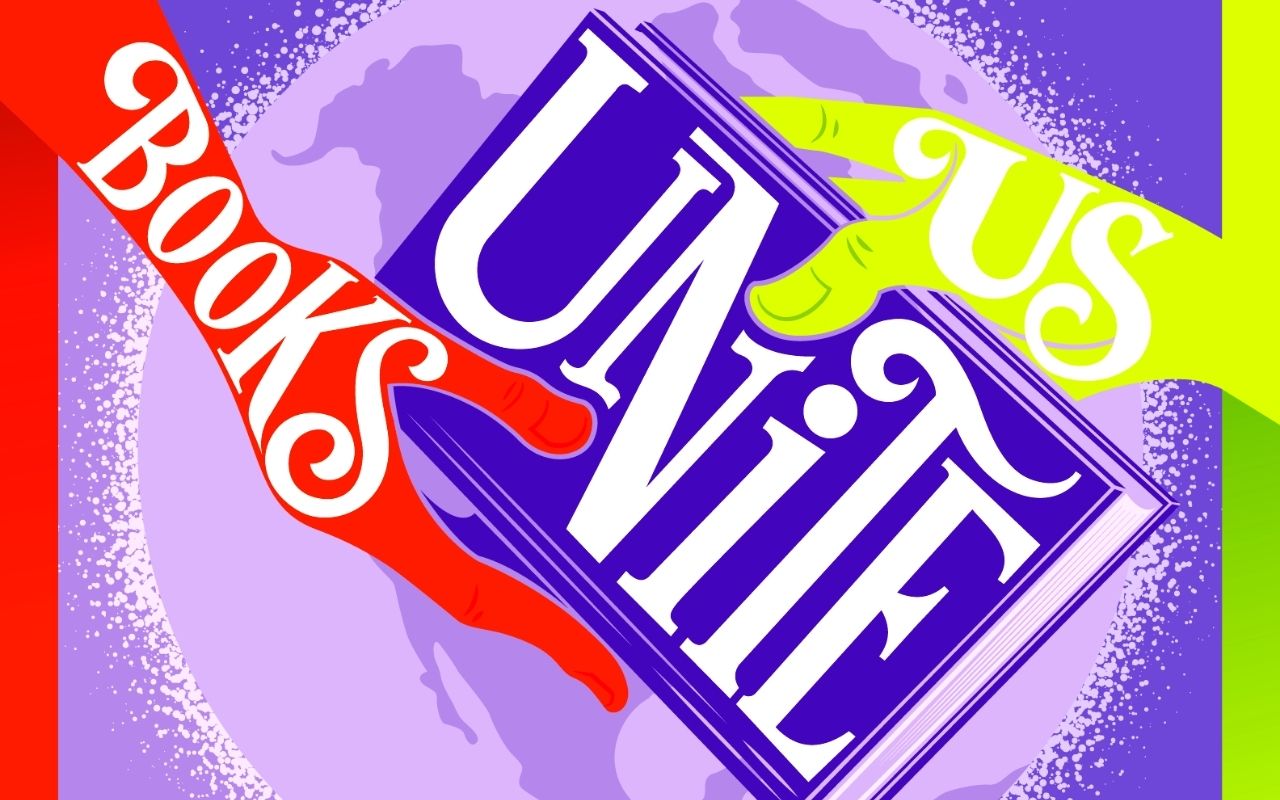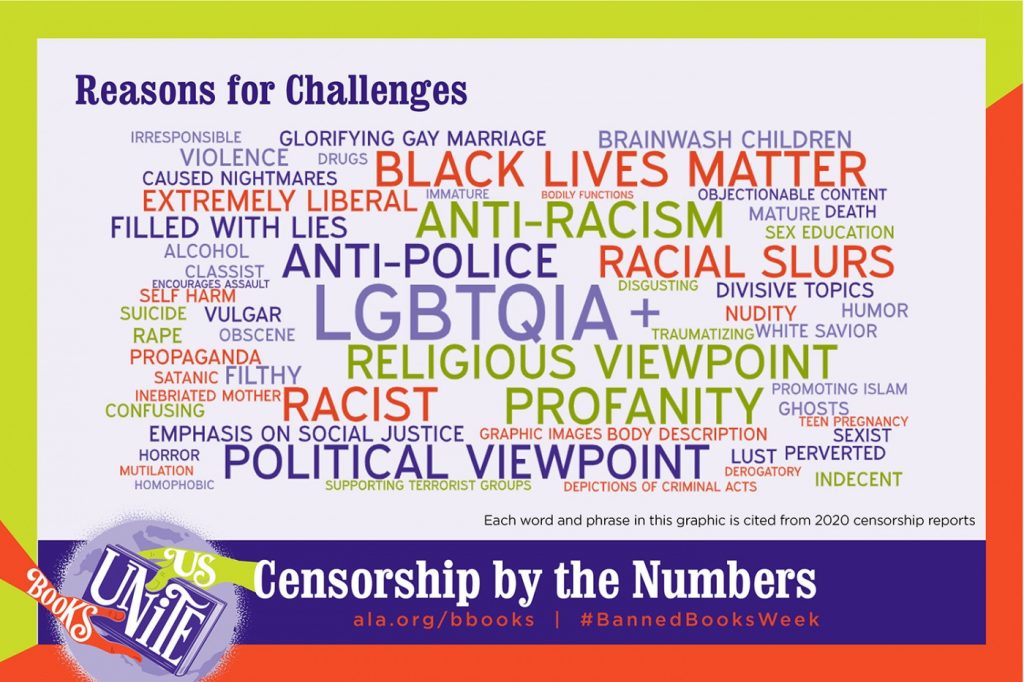
Banned Books Week 2021: September 26 – October 2
Banned Books Week is an annual event celebrating the freedom to read. Banned Books Week launched in 1982 in response to a sudden surge in the number of challenges to books in schools, bookstores, and libraries. Typically held during the last week of September, it highlights the value of free and open access to information. Banned Books Week brings together the entire book community — librarians, booksellers, publishers, journalists, teachers, and readers of all types — in shared support of the freedom to seek and express ideas, even those some consider unorthodox or unpopular.
What is a challenge? What is a ban?
Book bans generally start with a challenge — a verbal or formal written attempt to restrict access to materials or remove them entirely. A ban happens when those materials are actually removed from the shelves, classrooms, or performance spaces.
Are books really still banned in the United States?
Yes! Every year the American Library Association reports hundreds of challenges to book in schools and libraries all over the United States, and ALA estimates that the unreported number of challenges is significantly higher. People continually try to take away readers' power to decide what books are suitable for themselves or their children by initiating challenges to remove books from libraries. In some cases, books are actually removed from libraries and classrooms. This infringes on readers' rights and limits access to materials, especially for those who do not have the opportunity to purchase books.
Why are books challenged?
Books are usually challenged with the best intentions, often motivated by a desire to protect younger readers from "inappropriate" content. Books are challenged over sexual content, profanity, age appropriateness, violence, religious viewpoint, LGBTQ content, political bias, drug and alcohol use, suicide, and much more.
Who challenges and bans books?
Most challenges come from library patrons and parents, who raise concerns over the content they find objectionable. Sometimes, a library or school staffer or administrator will bring a challenge. Politicians, political organizations, and religious groups have also targeted books and plays. On a few occasions, students have brought complaints to administrators.
The ultimate arbitrator of the challenge depends on the policies of the institution where a book is challenged. Institutions without a thoughtful reconsideration protocol are far more likely to ban materials.
Top 10 Most Challenged Books of 2020
Melissa's Story (George) by Alex Gino
(Note: The author retitled the book, Melissa's Story in 2021 since George is a name the main character no longer wishes to use.)
When people look at George, they think they see a boy. But she knows she's not a boy. She knows she's a girl. George thinks she'll have to keep this a secret forever. Then her teacher announces that their class play is going to be Charlotte's Web. George really, really, REALLY wants to play Charlotte. But the teacher says she can't even try out for the part . . . because she's a boy. With the help of her best friend, Kelly, George comes up with a plan. Not just so she can be Charlotte -- but so everyone can know who she is, once and for all.
Challenged, banned, and restricted for LGBTQIA+ content, conflicting with a religious viewpoint and not reflecting “the values of our community.”
Stamped: Racism, Antiracism, and You by Jason Reynolds and Ibram X. Kendi
Stamped traces the history of racism and the many political, literary, and philosophical narratives that have been used to justify slavery, oppression, and genocide. Framed through the ideologies and thoughts of segregationists, assimilationists, and antiracists throughout history, the book demonstrates that the “construct of race has always been used to gain and keep power, whether financially or politically,” and that this power has been used to systemically and systematically oppress Black people in the United States for more than four hundred years.
Banned and challenged because of the author’s public statements and claims that the book contains “selective storytelling incidents” and does not encompass racism against all people.
All American Boys by Jason Reynolds and Brendan Kiely
A bag of chips. That’s all sixteen-year-old Rashad is looking for at the corner bodega. What he finds instead is a fist-happy cop, Paul Galuzzi, who mistakes Rashad for a shoplifter, mistakes Rashad’s pleadings that he’s stolen nothing for belligerence, mistakes Rashad’s resistance to leave the bodega as resisting arrest, mistakes Rashad’s every flinch at every punch the cop throws as further resistance and refusal to STAY STILL as ordered. But how can you stay still when someone is pounding your face into the concrete pavement?
But there were witnesses: Quinn Collins—a varsity basketball player and Rashad’s classmate who has been raised by Paul since his own father died in Afghanistan—and a video camera. Soon the beating is all over the news and Paul is getting threatened with accusations of prejudice and racial brutality. Quinn refuses to believe that the man who has basically been his savior could possibly be guilty. But then Rashad is absent. And absent again. And again. And the basketball team—half of whom are Rashad’s best friends—start to take sides. As does the school. And the town. Simmering tensions threaten to explode as Rashad and Quinn are forced to face decisions and consequences they had never considered before.
Banned and challenged for profanity, drug use, and alcoholism and because it was thought to promote antipolice views, contain divisive topics, and be “too much of a sensitive matter right now.”
Speak by Laurie Halse Anderson
The first ten lies they tell you in high school.
"Speak up for yourself—we want to know what you have to say."
From the first moment of her freshman year at Merryweather High, Melinda knows this is a big fat lie, part of the nonsense of high school. She is friendless, outcast because she busted an end-of-summer party by calling the cops, so now nobody will talk to her, let alone listen to her. As time passes, she becomes increasingly isolated and practically stops talking altogether. Only her art class offers any solace. Through her work on an art project, she can finally face what really happened at that terrible party: she was raped by an upperclassman, a guy who still attends Merryweather and is still a threat to her. Her healing process has just begun when she has another violent encounter with him. But this time, Melinda fights back, refuses to be silent, and thereby achieves a measure of vindication.
Banned, challenged, and restricted because it was thought to contain a political viewpoint, it was claimed to be biased against male students, and it included rape and profanity.
The Absolutely True Diary of a Part-Time Indian by Sherman Alexie
Bestselling author Sherman Alexie tells the story of Junior, a budding cartoonist growing up on the Spokane Indian Reservation. Determined to take his future into his own hands, Junior leaves his troubled school on the rez to attend an all-white farm town high school where the only other Indian is the school mascot.
Heartbreaking, funny, and beautifully written, The Absolutely True Diary of a Part-Time Indian, which is based on the author's own experiences, coupled with poignant drawings by Ellen Forney that reflect the character's art, chronicles the contemporary adolescence of one Native American boy as he attempts to break away from the life he was destined to live.
Banned and challenged for profanity, sexual references, and allegations of sexual misconduct on the part of the author.
Something Happened in Our Town: A Child’s Story about Racial Injustice by Marianne Celano, Marietta Collins, and Ann Hazzard, illustrated by Jennifer Zivoin
Something Happened in Our Town follows two families — one White, one Black — as they discuss a police shooting of a Black man in their community. The story aims to answer children's questions about such traumatic events and to help children identify and counter racial injustice in their own lives.
Includes an extensive Note to Parents and Caregivers with guidelines for discussing race and racism with children, child-friendly definitions, and sample dialogues. Free, downloadable educator materials (including discussion questions) are available at www.apa.org.
Challenged for “divisive language” and because it was thought to promote antipolice views.
To Kill a Mockingbird by Harper Lee
One of the most cherished stories of all time, To Kill a Mockingbird has been translated into more than forty languages, sold more than forty million copies worldwide, served as the basis for an enormously popular motion picture, and was voted one of the best novels of the twentieth century by librarians across the country. A gripping, heart-wrenching, and wholly remarkable tale of coming-of-age in a South poisoned by virulent prejudice, it views a world of great beauty and savage inequities through the eyes of a young girl, as her father—a crusading local lawyer—risks everything to defend a black man unjustly accused of a terrible crime.
Banned and challenged for racial slurs and their negative effect on students, featuring a “white savior” character, and its perception of the Black experience.
Of Mice and Men by John Steinbeck
They are an unlikely pair: George is "small and quick and dark of face"; Lennie, a man of tremendous size, has the mind of a young child. Yet, they have formed a "family," clinging together in the face of loneliness and alienation.
Laborers in California's dusty vegetable fields, they hustle work when they can, living a hand-to-mouth existence. For George and Lennie have a plan: to own an acre of land and a shack they can call their own. When they land jobs on a ranch in the Salinas Valley, the fulfillment of their dream seems to be within their grasp. But even George cannot guard Lennie against the provocations of a flirtatious woman, nor predict the consequences of Lennie's unswerving obedience to the things George taught him.
Banned and challenged for racial slurs and racist stereotypes and their negative effect on students.
The Bluest Eye by Toni Morrison
In Morrison’s bestselling first novel, Pecola Breedlove—an 11-year-old Black girl in an America whose love for its blond, blue-eyed children can devastate all others—prays for her eyes to turn blue: so that she will be beautiful so that people will look at her so that her world will be different. In the autumn of 1941, the year the marigolds in the Breedloves' garden do not bloom. Pecola's life does change- in painful, devastating ways. This story is a vivid evocation of the fear and loneliness at the heart of a child's yearning and the tragedy of its fulfillment.
Banned and challenged because it was considered sexually explicit and depicted child sexual abuse.
The Hate U Give by Angie Thomas
Sixteen-year-old Starr Carter moves between two worlds: the poor neighborhood where she lives and the fancy suburban prep school she attends. The uneasy balance between these worlds is shattered when Starr witnesses the fatal shooting of her childhood best friend Khalil at the hands of a police officer. Khalil was unarmed.
Soon afterward, his death is a national headline. Some are calling him a thug, maybe even a drug dealer and a gangbanger. Protesters are taking to the streets in Khalil’s name. Some cops and the local drug lord try to intimidate Starr and her family. What everyone wants to know is: what really went down that night? And the only person alive who can answer that is Starr.
But what Starr does—or does not—say could upend her community. It could also endanger her life.



Add a comment to: YA Friday: Books Unite Us. Censorship Divides Us.